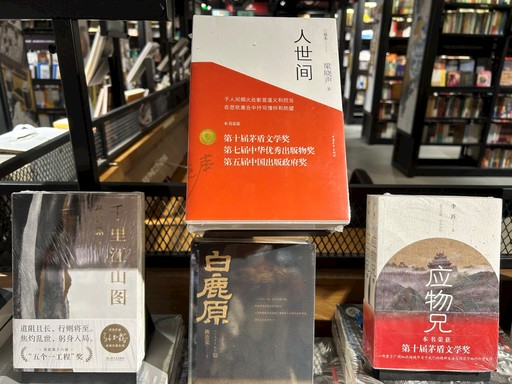
. > WHAT'S NEW > TOPLINE
Mao Dun Literature Prize winners revealed
Author : DUAN DANJIE Source : Chinese Social Sciences Today 2023-09-09

A display of novels that have won the Mao Dun Literature Prize Photo: Yang Lanlan/CSST
The winners of the 11th Mao Dun Literature Prize were announced in Beijing on August 11. The five award-winning full-length novels are Yang Zhijun’s The Snow Mountain and the Homeland, Qiao Ye’s Baoshui Village, Liu Liangcheng’s Ben Ba, Sun Ganlu’s A Panorama of Rivers and Mountains, and Dong Xi’s Resonance.
Sponsored by the China Writers Association (CWA), the prize is awarded every four years. Since its inception in 1981, a total of 48 works have been awarded over the previous 10 sessions. This prestigious award has made significant contributions to the flourishing of long-form fiction writing, the establishment of contemporary literary classics, and the advancement of the literary field.
Excellent novels
The Snow Mountain and the Homeland affectionately reflects upon the arduous exploration of previous generations and the pioneers of the grasslands, capturing the era of tremendous changes in high-altitude regions and the spiritual journey of the grassland herdsmen. The work exudes a rich ethnic life atmosphere, providing a panoramic display of the transformation of traditional Tibetan pastoral society and way of life amidst the wave of modernization. It has been praised by critics as a “heavy, solid, and poetic realism masterpiece.” Yang Zhijun is known as being among the first batch of “Qilu Cultural Celebrities,” and his another representative work Mastiffs of the Plateau was shortlisted for the seventh Mao Dun Literature Prize.
Baoshui Village tells the story of how a remote village deep in the Taihang Mountains transformed from a traditional rural area into a new village featuring cultural tourism. It is a literary portrayal of modernization in rural China, with a strong sense of reality, a vivid sense of the era, and a conscious literary mission. According to Qiao Ye, the story and characters in the novel were derived from her own diverse and immersive village life over a long period of time. Qiao is also China’s first “post-70s” female writer to win the prize. She has produced myriad prominent works, such as To Live is the Slowest Process, and has been honored with awards such as the Lu Xun Literature Prize.
Ben Ba is set against the backdrop of the Mongolian heroic epic Jangar. Liu Liangcheng once confessed that the novel is an epic written for his own childhood. Liu traces the lost childhood of humanity through the magnificence of art with imagination and speculation, revealing the spiritual pursuit of modern people to return to nature.
A Panorama of Rivers and Mountains takes the reader back to 1930s Shanghai, uncovering hidden yet significant historical events. Sun Ganlu, with the composing power of a novelist, writes a thrilling journey full of twists and turns, depicting the spiritual map of a generation of idealists struggling relentlessly for enlightenment. Sun is a representative of Chinese avant-garde literature. His works such as I am a Young Drunkard and Breath have established his status in vanguard literature circles.
Resonance tells a suspenseful story that interweaves a criminal investigation case with a family marriage, running the two storylines in alternating chapters. The integration of criminal investigation reasoning and psychological deliberation responds to the eternal theme of “the secret zone of the soul is an echo of the big world.” Resonance is a long-awaited masterpiece of author Dong Xi, who spent nearly a decade honing his skills, and is also his first attempt at “reasoning plus psychology” in an innovative and remarkable work.
Reflecting national spirit
According to Zhang Hongsen, secretary of the Leading Party Members’ Group of CWA and vice chairman of CWA, and head of the award committee of the 11th Mao Dun Literature Prize, it is the committee’s mission and goal to select those excellent works that embody the national spirit, the spirit of the times, the achievements of literary development, and the level of thought and art in the new era.
To this end, the jury is acutely aware of the solemn value of the prize as a national-level literary award, bearing in mind the guiding philosophy and evaluation criteria. For the sake of the sound overall development of Chinese literature, they demonstrate a profound respect for literary law, values, and creations, earnestly and meticulously performing their duties with a sense of social responsibility and artistic conscience. Correspondingly, the five works are presented as representatives of the outstanding achievements in novel writing over the past four years.
The competition for the prize is open to full-length novels that were first published on the Chinese mainland between 2019 and 2022. The collection of entries began on March 15 and concluded on April 30, 2023. After the catalogue of entries was made public for a month on June 18, a total of 238 candidate works were identified. After writers, critics, and literary organization staff from all over the country formed a prize committee to conduct respective reading, centralized intensive reading, and in-depth discussion, the jury selected and publicized 10 nominated works on August 7. On August 11, after the sixth round of appraisal and voting by the committee, five winning works were finally selected, which were examined and approved by the secretariat of CWA and announced to the public.
The award ceremony will be held in mid-November in Tongxiang, Zhejiang Province, the hometown of famous Chinese novelist Mao Dun (1896–1981).
Ye Shengtao made Chinese fairy tales from a wilderness
Ye Shengtao (1894–1988) created the first collection of fairy tales in the history of Chinese children’s literature...
-
How northern ethnicities integrated into Chinese nation
2023-09-18
-
Mogao caves
2023-09-12
-
Mogao Grottoes as ‘a place of pilgrimage’
2023-09-12
-
Time-honored architectural traditions in China
2023-08-29
-
Disentangling the civilizational evolution of China
2023-08-28
-
AI ethics in science fiction
2023-08-23













 2011-2013 by www.cssn.cn. All Rights Reserved
2011-2013 by www.cssn.cn. All Rights Reserved